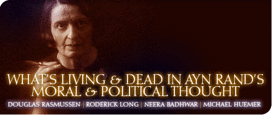There was something I didn’t follow in Doug’s last post, under his third observation. It seemed as though Doug was saying that we must interpret life in terms of flourishing rather than survival, because it is impossible to exist without a specific identity. I don’t follow this. People who are not flourishing (by Doug’s lights) exist, right? And they are not lacking in a specific identity, are they? So I don’t see why the concept of life couldn’t include both flourishing and non-flourishing people.
I thank Rod for his recent post. I think that “good for x” means “in x’s interests”. And I think that by “take an attitude of indifference toward x,” Rod means approximately, “not hold that one should pursue x (at least ceteris paribus)” (only thus would the reasoning bridge the is-ought gap). So, I think Rod’s premise (2) can be paraphrased like this:
2′. One cannot, without incoherence, recognize that x is in one’s interests but not hold that one should pursue x (ceteris paribus). Or:
2”. It is incoherent to doubt that one should pursue one’s interests (ceteris paribus). Or even:
2”’. It is a logical truth that one should pursue one’s interests (ceteris paribus).
If you have this premise, then I don’t think you need Rod’s premise (1), nor any talk about biological organisms. (2) by itself eliminates the is/ought gap. Can it be that easy?

